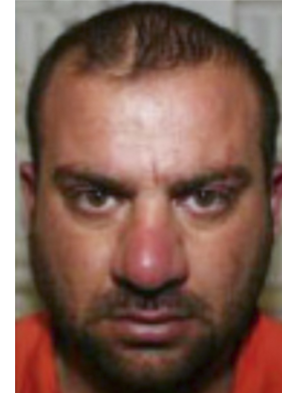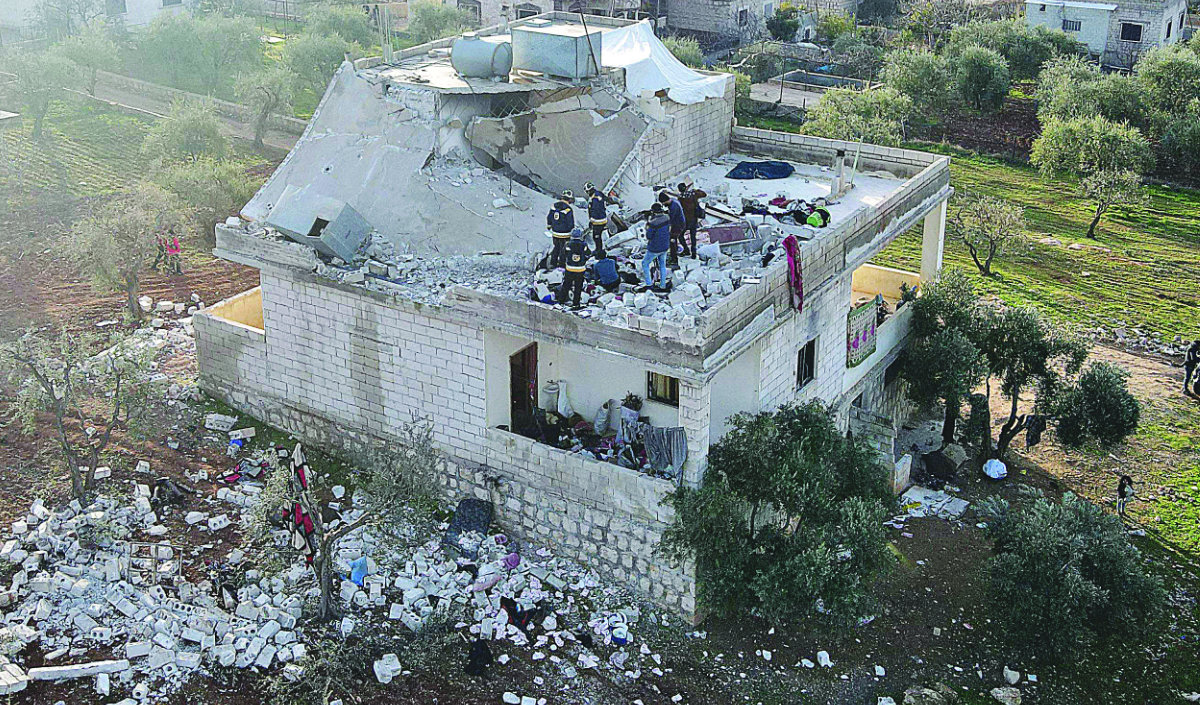AMMAN/WASHINGTON: President Joe Biden said on Thursday a global “terrorist threat” was removed when the head of the Daesh group blew himself up after US special forces swooped in on his Syrian hideout in an “incredibly challenging” nighttime helicopter raid.
“The United States military forces successfully removed a major terrorist threat to the world, the global leader of Daesh,” Abu Ibrahim Al-Hashimi Al-Qurashi, Biden said in nationally televised remarks.
The operation dealt the biggest setback to the terrorist organization since Qurashi’s predecessor, the better-known Abu Bakr Al-Baghdadi, was killed in a US commando raid in the same Syrian region of Idlib in 2019.
Biden said he ordered an assault by troops, rather than merely bombing the house where the Daesh leader was located, in order to minimize civilian casualties, even though this meant “a much greater risk to our own people.”

Abu Ibrahim Al-Qurashi. (AP)
The house contained “families, including children” and “as our troops approached to capture the terrorist, in a final act of desperate cowardice, with no regard to the lives of his own family or others in the building, he chose to blow himself up,” Biden said.
Qurashi did not merely set off a suicide vest to kill himself, but detonated the entire “third floor” of the residence in the town of Atme, Biden said, “taking several members of his family with him.”
An Iraqi from the Turkmen-majority city of Tal Afar, Qurashi was also known as Amir Mohammed Said Abd Al-Rahman Al-Mawla. He replaced Baghdadi after his death in a US raid in October 2019, which also ended when Baghdadi blew himself up.
Quraishi was hiding out in a region of Syria that is home to several militant groups including Huras Al-Din (Guardians of Religion), an Al-Qaeda-affiliated faction whose leaders include foreign fighters.
HIGHLIGHT
In some of the rooms, blood was splattered high on the walls and stained the floor, littered with foam mattresses and shards from smashed doors.
The US government had offered a $10 million reward for information leading to Qurashi, one of the world’s most wanted fugitives.
The head of the Syrian Observatory for Human Rights, Rami Abdel Rahman, said that “13 people at least were killed, among them four children and three women, during the operation.”
The owner of the building where Qurashi was staying described his tenant as leading an ordinary life.
“This guy lived here for 11 months. I didn’t see anything suspicious or notice anything,” the landlord, who gave his name only as Abu Ahmad, said. “He would come and pay the rent and leave. He lived with his three children and his wife. His widowed sister and her daughter were living above them,” he said.
Residents in the town of Atmeh, near the Turkish border, said helicopters landed and heavy gunfire and explosions were heard during the raid that began around midnight. US forces used loud speakers to warn women and children to leave the area, they said.
US military procedures to guard against civilian casualties are under scrutiny following a high-profile mistaken drone strike in Afghanistan that the Pentagon initially hailed a success.

The building of raw cinder blocks bore the scars of an intense battle, with torn window frames, charred ceilings and a partly collapsed roof. (AFP)
A witness said he woke to the sound of helicopters. “Then we heard small explosions. Then we heard stronger explosions,” Abu Ali, a displaced Syrian living in Atme said, adding that US forces told residents “not to worry.”
Elite, US-trained members of the Kurdish-led Syrian Democratic Forces joined the operation, Abdel Rahman said.
The building of raw cinder blocks bore the scars of an intense battle, with torn window frames, charred ceilings and a partially collapsed roof.
Biden and US officials described Quraishi as the “driving force” behind the 2014 genocide of minority Yazidis in northern Iraq, and said he oversaw a network of Daesh branches from Africa to Afghanistan.
“Last night’s operation took a major terrorist leader off the battlefield and has sent a strong message to terrorist around the world: We will come after you and find you,” Biden said.
Since its defeat on the battlefield nearly three years ago, Daesh has waged insurgent attacks in Iraq and Syria. The most recent was last month when its fighters stormed a prison in northeastern Syria housing Daesh suspects.
Local leaders, security officials and residents in northern Iraq say it has been re-emerging as a deadly threat, aided by a lack of central control in many areas.
“Quraishi’s killing is a huge deal and a huge blow to Daesh because Daesh never heard from this new leader,” Syria analyst Hassan Hassan said. “I think Daesh will continue to be weak and under pressure as long as the Americans are on the ground in Iraq and Syria and involved, because the US serves as feet on a spring: once you step off, it sort of bounces back.”














